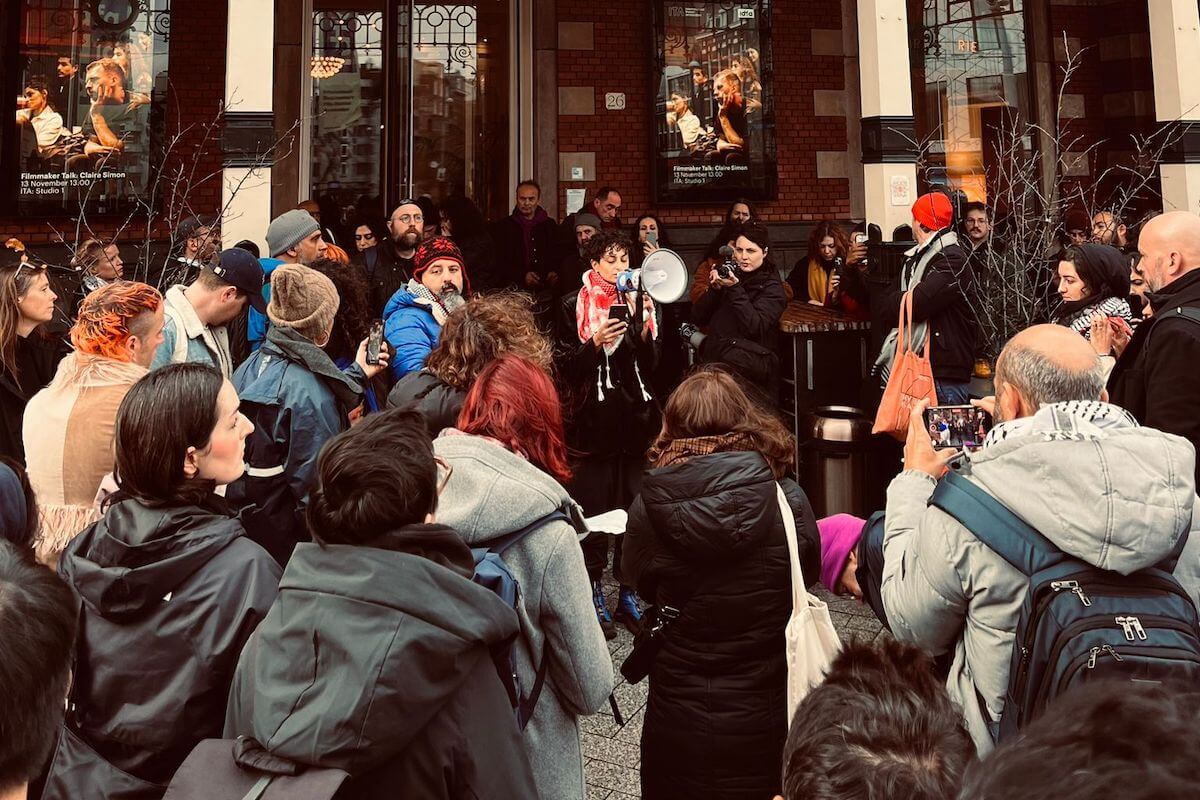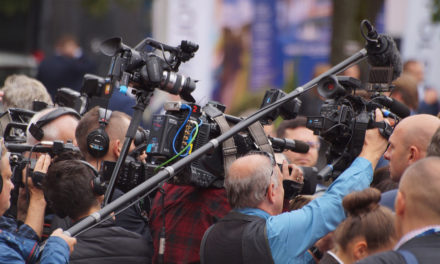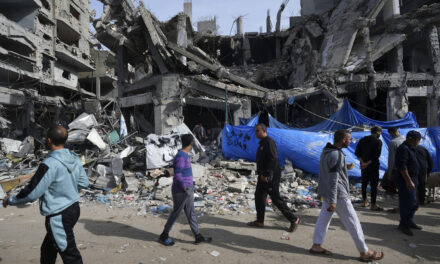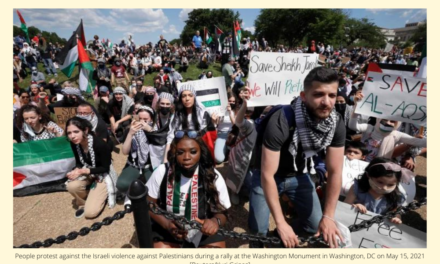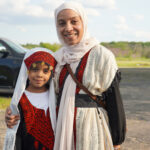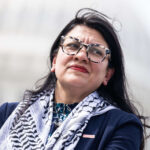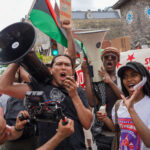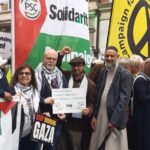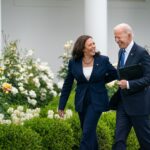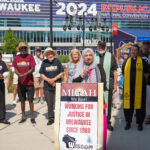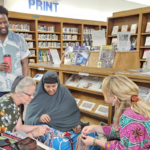FILMMAKERS AND ATTENDEES PROTESTING IN SOLIDARITY WITH PALESTINE AND AGAINST IDFA’S STATEMENTS, AMSTERDAM, NOVEMBER 13, 2023.
Filmmakers are taking action against the International Documentary Film Festival Amsterdam (IDFA) following the festival’s mischaracterization and attack on the slogan “From the River to the Sea Palestine Will be Free” and unwillingness to stand in solidarity with Palestinians facing Israel’s genocidal attack on Gaza.
The IDFA, the world’s biggest international documentary film festival, has a history of highlighting Palestinian filmmakers. But recent statements and events by the festival have been viewed as a painful betrayal.
As Gaza-based filmmaker Mohammed Almughanni explained during one of his speeches at IDFA, “If you endorse me as a filmmaker showing the pain of Palestinians but you don’t endorse Palestinians having a life with dignity, your attention for my films means nothing to me. Films mean nothing to me if you don’t care for a free Palestine for the people in my films.” In another speech, Almughanni reacted to IDFA’s attack on the slogan “From the River to the Sea Palestine Will be Free,” saying, “If you don’t want us to chant for freedom from the river to the sea, then from where to where? From this iron wall to the other? From this barbwire to the next?”
So far, 21 filmmakers have withdrawn their films from the festival, and actions in solidarity with Palestine continue to dominate the festival.
IDFA statements
On November 10, IDFA released a statement apologizing for the display of a banner with the slogan “From the River to the Sea Palestine Will be Free” during an intervention organized by Netherlands-based activist group Workers for Palestine (WFP) on the festival’s opening night. In the statement, IDFA showed gratitude towards those who reached out to express “the hurt they felt” after being confronted with the slogan and the protest act against the festival’s initial silence on the genocide in Gaza. Referring to it as “hurtful”, the statement quotes the festival’s artistic director Orwa Nyrabia, stating that this slogan “does not represent IDFA and was and will not be endorsed.”
Earlier that day, a petition had been released in the name of the Israeli documentary and film community criticizing Nyrabia’s “applauding and cheering” of the protestors on November 8, the festival’s opening night. Even though, according to Dutch law, the chant “From the River to the Sea Palestine Will be Free” is not considered antisemitic and is protected speech, the petition conflated the idea of Palestinian liberation with antisemitism, arguing that “allowing and applauding a sign which states that ‘From River to the Sea Palestine will be Free’ is a call for the eradication of Israel, the Jewish homeland and of Jews in general.”
Following the IDFA’s November 10 statement, filmmakers began withdrawing their documentaries from the festival and issuing statements calling for a ceasefire, sharing the real meaning of the criminalized slogan, and expressing their support of the protest act that took place on the festival’s opening night. Q&A moderators, performers, jury members, and festival staff also soon began quitting and criticizing the festival’s approach towards the genocide in Palestine and their silencing of protestors’ voices. In a letter shared with Mondoweiss, written by a group of festival employees addressing the IDFA directors, these employees criticize the IDFA’s usage of the pronoun “we” in their statement, which seemed to indicate it was expressing “the position of the organization as a whole,” as many of the festival staff stand in solidarity with Palestine and do not see their beliefs reflected in the IDFA’s statements.
Palestinian filmmaker Basma al-Sharif was one of the first to withdraw her film and participation as a jury member from the IDFA, criticizing the festival for condemning the slogan instead of “denouncing the genocide taking place right now in Gaza.”
“From the River to the Sea is the land of historic Palestine that stretches from the river Jordan to the Mediterranean Sea,” she shared in a statement written collectively by a group of filmmakers at IDFA who were alarmed by the festival’s response to the aforementioned chant. “From the River to the Sea Palestinians are subjected to the conditions of occupation and apartheid. From the River to the Sea Palestinians should unite in their struggle for liberty, justice and self-determination. From the River to the Sea we want: Palestinian and Jews, foreign workers and refugees, to be equal and free,” this group of documentary makers added.
Maryam Tafakory, another filmmaker who withdrew from the festival, released a statement upon her withdrawal, saying she felt betrayed and outraged by the IDFA’s “damaging slander” of the slogan and their statement’s emphasis on “the universal dream of a peaceful world.” “By peace they only mean a return to occupation and quiet theft of land and murder” she wrote. “There is no middle in an apartheid state. There is no middle when one side admits to the ethnic cleansing of the other side” she added.
Tafakory also took aim at a second statement that IDFA issued on November 10, just hours after the first condemning the liberatory Palestinian statement. In the second statement, IDFA called for “an immediate ceasefire,” but many pro-Palestine and Palestinian filmmakers felt the apologetic tone of the second statement failed to express solidarity with the Palestinian struggle for liberation. IDFA’s willingness to feature films by Palestinians while refusing to make a clear statement in solidarity with them is a form of capitalizing on the Palestinian struggle and a manifestation of a pattern that is not unique to the IDFA but an endemic practice of Western art institutions which exploit emancipatory struggles and peoples through tokenization.
Protesting the festival’s silence
Reflecting on the speeches, statements, and withdrawals followed by the protest at the IDFA opening night, film producer and curator Yara Yuri Safadi, who worked with the festival as a moderator but this year decided to quit following the IDFA’s statement, explained to Mondoweiss that in the weeks leading up to the festival, she had waited for the IDFA to call for a ceasefire. The first day of the festival, however, arrived, and the IDFA kept its silence.
“I decided to go to the opening night anyway,” Safadi explained to Mondoweiss, “and I waited for Orwa to say those few words: Gaza, Palestine, ceasefire, liberation.” When the festival’s artistic director did not share these sentiments during his opening speech, together with other protestors, Safadi took out two banners, one displaying the slogan “From the River to the Sea, Palestine will be Free”, and another banner that said, “Institutional silence is violence.” Safadi chanted “ceasefire now” while others took one of the banners on stage, hanging the other from the balcony alongside a Palestinian flag and disrupting the event’s “business as usual.” Safadi says the protestors’ call for a ceasefire was met with booing by the IDFA’s board. “Who boos a call for ceasefire? Who is prohibiting me from calling to stop a genocide?” she asked when recounting the story in a speech given on November 13.
Other attendees and IDFA staff, however, stood up during the action and applauded the protestors. Upon releasing footage from this protest act, Workers For Palestine, a recently established activist group that advocates for the liberation of occupied Palestine from within art, social, academic, and civic institutions in the Netherlands, wrote, “It appears that IDFA regards Palestinians as valuable only when they serve as a progressive front to their institute,” contrasting the festival’s inclusion of Palestinian filmmakers’ work with its painful silence on Gaza and it’s attack on pro-Palestinian voices in the face of Israeli’s settler colonialism and ongoing genocide.
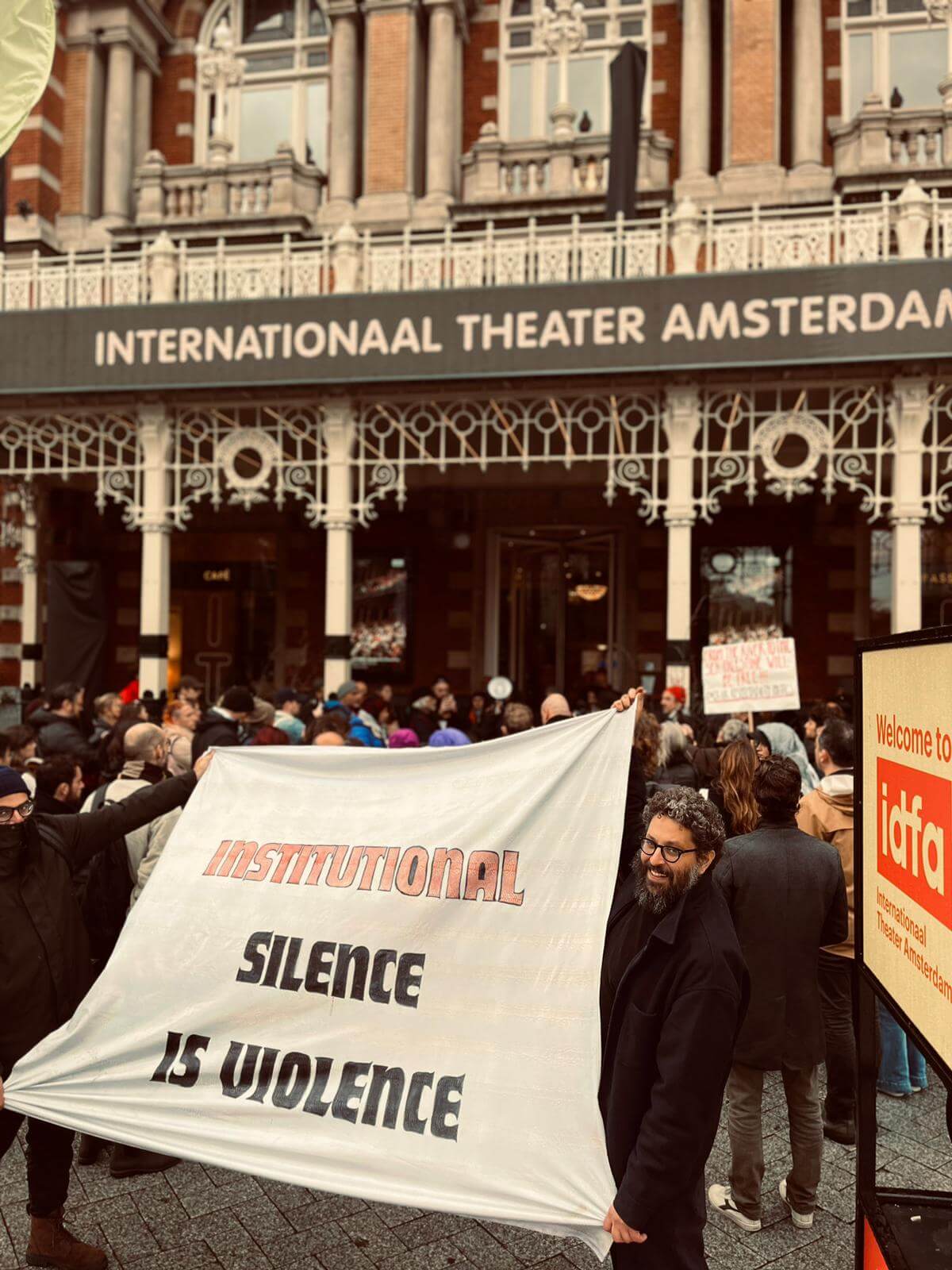
FILMMAKERS AND ATTENDEES PROTESTING IN SOLIDARITY WITH PALESTINE AND AGAINST IDFA’S STATEMENTS, AMSTERDAM, NOVEMBER 13, 2023.
Palestine Film Institute withdrawal
Since an initial flurry of withdrawals, the number of directors refusing to show their films at the IDFA continues to grow. On November 12, the Palestine Film Institute (PFI) released a petition announcing the institute’s solidarity with the protestors who had disrupted the festival’s opening and their withdrawal from the IDFA. The PFI —an independent institute created for the purpose of developing, promoting, and preserving Palestinian cinema— has been collaborating with IDFA for seven years, including creating the Palestinian Documentary Hub: an annual one-day event where Palestinian documentary filmmakers present their ongoing projects in order to forge connections with the international film industry.
“On the day before this year’s Documentary Hub, with everything that is happening at IDFA, we asked what it means to present projects about Palestine at IDFA today?” Mohanad Yaqubi, consultant and public program creator of the PFI, explained to Mondoweiss. In the end, the PFI decided to proceed with the presentations by the Palestinian filmmakers Dalia Al-Kury, Elettra Bisogno, and Noora Said as a means to reclaim the festival’s space but then issued the institute’s statement of withdrawal from all organized activities at the IDFA market. “They presented, and it was amazing because these presentations show the deep connections between what’s happening today and the Palestine narrative, the Palestinian documentary film,” Yaqubi added.
Upon withdrawing from the festival, the PFI also released a petition and called on filmmakers to continue taking action in solidarity with Palestine. The PFI urged filmmakers to sign their petition, pull their films out of the festival, and directly critique the IDFA’s response to pro-Palestinian protests or to utilize Q and A’s, talks, and panels to focus on Palestine. Filmmakers who withdrew from the festival also demanded the IDFA to acknowledge their statement’s criminalization of Palestinian voices and narratives and to publicly announce the reason screenings were being canceled, which the festival board has refused to do so far.
Despite the IDFA’s historical foregrounding of Palestinian filmmakers, Yaqubi says that today, he feels betrayed by the festival’s belated call for a ceasefire and its inability to show solidarity with Palestinian filmmakers. “Palestinian filmmakers had to spill emotions, which is a heavy burden, in front of people and in spaces they trusted to make IDFA understand this is 75 years of occupation,” he said to Mondoweiss. “This betrayal of trust is the hardest part.”
On November 13, one day after the Palestine Film Institute made their withdrawal public, they announced a protest in front of one of the festival’s main venues, the International Theatre of Amsterdam. “We can not continue business as usual,” they wrote, inviting filmmakers and IDFA audience members to join their demand for “an immediate ceasefire, an end to the genocide, and an end to the occupation of Palestine.”
Solidarity continues
More than 50 protestors gathered in front of the IDFA venue, where statements of withdrawal written by the filmmakers and performers, such as Tafakory and Geo Wyexwere being read. As Safadi explained to Mondoweiss, “I want to highlight that most of the filmmakers and IDFA staff who supported us by joining the withdrawal, or by reading statements before and after their screenings, and dedicating Q&A’s to Palestine are from the Global South, from South Africa, Iran, or indigenous, and/or people who identify as queer. All the support has come from these people and the already existing networks of solidarity that connect us.”
The networks of solidarity highlighted by Safadi were also verbalized in a speech given at the protest by prominent documentary maker and part of the Palestine solidarity movement in India, Anand Patwardhan. After his speech, Patwardhan told Mondoweiss that despite some filmmakers’ choice to withdraw from the IDFA, “it should be understood that several Palestinians and their supporters like myself decided not to withdraw our films but to use the IDFA platform to amplify our opposition to the ongoing massacre in Gaza. I applaud those who pulled out of the festival and sparked an international debate. I applaud those who stayed to spark the debate from within. I applaud those who allowed us the space to do it in.” As Palestinian filmmaker Noora Said explained to Mondoweiss, “The PFI suggested diverse actions, not only withdrawal. And many filmmakers and artists reacted by choosing one of the different suggested actions. Sometimes, it might be more helpful for Palestinians and their supporters to protest in ways different than withdrawal.”
One of the performing groups who expressed their solidarity was Queer Choir Amsterdam, who sang “From the River to the Sea, Palestine will be Free” during one of IDFA’s events. This group also issued a statement arguing that “IDFA profits constantly by programming films on oppression, violence and decolonisation, but have not yet had the courage to acknowledge and speak up against an ongoing genocide.”
Solidarity with the Palestinian cause was also expressed during the gathering organized by PFI on November 13 after the demonstration. The sound of protestors chanting “ceasefire now” filled the hallways of the International Theatre of Amsterdam as they made their way to the solidarity event, held in one of the spaces inside the building. At this event, filmmakers such as Rehad Desai, Sky Hopinka, and Niles Atallah expressed solidarity with the Palestinian struggle for liberation.
As Desai explained to Mondoweiss, “Sky, a Native American filmmaker, and I, a South African filmmaker, spoke to the question of what we are witnessing in Palestine being a replay of colonial history, the blatant extermination of our respective peoples and the violence of an illegitimate state being equated with those who are reacting or responding to it.”
Moreover, at this solidarity event, Palestinian filmmakers Mohammed Almughanni, Dalia Al-Kury, Mohammad Jabaly, and Noora Said also went on stage to speak about their experiences as documentary filmmakers in Palestine and their feelings towards IDFA. Speaking of her experience of running the independent video production company Sirdab Studio from Ramallah, where she is based, Noora Said spoke of how she is prohibited from entering Gaza as the Gaza-based filmmaker and journalist Roshdi Sarraj who ran Sirdab Studio’s sister company, Ain Media was recently killed on October 22, Israeli airstrikes.
During a speech on her feelings towards IDFA, Al-Kury addressed “the people who are paying for these fancy buildings,” saying, “You fund our documentaries, but I doubt whether you actually watch them. I recommend you watch our films because if you did, you’d know about Palestine.” The gathering ended with the words of Mohanad Yaqubi, who said, “Here, we do documentaries, not business. And what’s the point of documentaries if they don’t change the world?”
